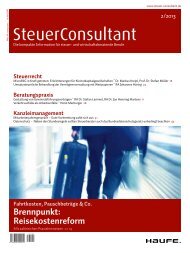Als PDF downloaden - Haufe.de
Als PDF downloaden - Haufe.de
Als PDF downloaden - Haufe.de
Erfolgreiche ePaper selbst erstellen
Machen Sie aus Ihren PDF Publikationen ein blätterbares Flipbook mit unserer einzigartigen Google optimierten e-Paper Software.
Business English<br />
Adjektiv o<strong>de</strong>r Adverb?<br />
Good or well, possible or possibly?<br />
Der Gebrauch von Adjektiven und Adverben in <strong>de</strong>r englischen Sprache wird häufig als schwierig empfun<strong>de</strong>n. In<br />
diesem Beitrag fin<strong>de</strong>n Sie Beispiele, die Ihnen <strong>de</strong>n Umgang mit <strong>de</strong>n Wortarten erleichtern sollen.<br />
How to use them<br />
Richard was extremely happy about his<br />
unexpected promotion.<br />
There are two adjectives and one adverb<br />
in that example; can you spot them and<br />
do you know which noun / verb they<br />
relate to?<br />
„Extremely“ is of course an adverb –<br />
often easy to recognise as they usually<br />
end in „-ly“, although watch out: some<br />
adjectives, eg: lovely, also end in „-ly“.<br />
Here the adverb modifies the adjective<br />
„happy“, which in turn modifies the<br />
proper noun „Richard“. „Unexpected“ is<br />
also an adjective, referring of course to<br />
the promotion.<br />
Adjectives are also used after the verb<br />
„to be“ when they refer back to the noun<br />
or pronoun before the verb, as in the following<br />
example:<br />
They have been <strong>de</strong>pressed all week<br />
because the presentation went badly.<br />
Finally, you also need to remember to<br />
use adjectives rather than adverbs after<br />
sense or appearance verbs, eg:<br />
> The new fragrance smells won<strong>de</strong>rful<br />
(not: …).<br />
> The paper appeared flimsy at first<br />
glance (not: …).<br />
Forming adjectives and adverbs<br />
Many adjectives and adverbs can be formed<br />
from nouns or verbs, eg:<br />
a crowd (noun) -> crow<strong>de</strong>d (adj.)<br />
the sun (noun) -> sunny (adj.)<br />
-> sunnily (adv.)<br />
an acci<strong>de</strong>nt -> acci<strong>de</strong>ntal (adj.)<br />
(noun) -> acci<strong>de</strong>ntally (adv.)<br />
There are a variety of suffixes that can<br />
be used to form adjectives, eg:<br />
Add „-y“: greed -> greedy<br />
Add „-ic“: alcohol -> alcoholic<br />
Add „-ful“: doubt -> doubtful<br />
Add „-al“: nation -> national<br />
Add „-ous“: danger -> dangerous<br />
Add „-less“: care -> careless<br />
Add „-able“: respect -> respectable<br />
Add „-ive“: progress -> progressive<br />
Adverbs are simpler to form, as they<br />
generally necessitate merely the addition<br />
of „-ly“, eg: dangerous ? dangerously.<br />
There are of course adverbs that do<br />
not take the „-ly“ suffix, including adverbs<br />
of frequency such as „often„ or<br />
„never“.<br />
Comparatives and superlatives<br />
When using adjectives and adverbs it<br />
helps to be able to compare things as<br />
well as <strong>de</strong>scribe them. For one syllable<br />
adjectives, the endings „-er“ and „-est“<br />
are used, while for longer adjectives you<br />
will need „more“ and „most“. So:<br />
low -> lower -> lowest<br />
and profitable -> more profitable<br />
-> most profitable<br />
There are some additional rules concerning<br />
spelling; first of all, if a word ends<br />
in „-e“ then just add an „-r“, eg:<br />
nice -> nicer -> nicest.<br />
If a word ends in a single vowel and a<br />
single consonant, then you need to double<br />
the last consonant, eg:<br />
big -> bigger -> biggest.<br />
ANZEIGE<br />
EXERCISE<br />
business-english<br />
Complete the following sentences, selecting the appropriate adverb<br />
or adjective from the list below!<br />
regular, carefully, shortly, well, better, <strong>de</strong>lighted, worse, regularly, short, early, careful<br />
1. John gets sales results than Joshua does.<br />
2. We expect payment.<br />
3. They pay their bills .<br />
4. The presentation was very .<br />
5. They will be here .<br />
6. He finished his task because he didn’t want to make any mistakes.<br />
7. She was because she didn’t want to make any mistakes.<br />
8. They are about the rise in profits.<br />
9. He spoke French than she did.<br />
10. She didn’t feel so she stopped work .<br />
Fachmodule auf<br />
business-english.<strong>de</strong><br />
<strong>Als</strong> Experte sind Sie im internationalen<br />
Business beson<strong>de</strong>rs<br />
gefor<strong>de</strong>rt. Personalverantwortliche,<br />
Controller und Unternehmer<br />
fin<strong>de</strong>n im Professional-Bereich von<br />
business-english.<strong>de</strong> speziell auf<br />
ihre Arbeitsanfor<strong>de</strong>rungen zugeschnittene<br />
Arbeitsvorlagen, Beiträge,<br />
Downloads und Trainings.<br />
Answers: 1. better (worse); 2. regular; 3. regularly;<br />
4. short; 5. shortly; 6. carefully; 7. careful; 8. <strong>de</strong>lighted;<br />
9. worse (better); 10. well (= BE)/good (= AE), early<br />
86 ProFirma 12 2011

















